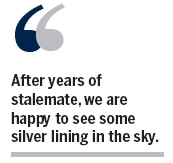Political compromise in sight
Updated: 2010-03-04 07:34
By Lau Nai-keung
|
|||||||||
The Ultimate Universal Suffrage Alliance, the more liberal faction of the opposition camp, publicly has made several concessions since its formation a month ago. These are moves that should be welcome, and its goodwill should be reciprocated. If both sides take steps towards conciliation, the outlook for reaching an agreement for the elections of 2012 now seems a great deal more favorable; and so is the subsequent smooth implementation of universal suffrage for the election of the Chief Executive in 2017 and that for the entire Legislative Council in 2020, as stipulated in the National People's Congress Standing Committee (NPCSC) decisions of 2007. After years of stalemate, we are happy to see a glimmer of a silver lining in the sky.
Now that they have given up their insistence on the abolition of functional constituencies and the deadline for "ultimate universal suffrage" (whatever that means), there are no fundamental differences between the position of the Alliance and that of the government as stated in the consultation proposal. The rest are just minor technical adjustments that should not cause too much of a problem in reaching a consensus, and getting enough votes to pass the relevant bill in the Legislative Council in June.

There is admittedly not too much room for concessions from the government, as it has practically used up all the space provided by the NPCSC interpretation of the Basic Law in 2004, but if all sides work together and use their imagination, we can come up with a win-win solution. My favorite is the proposal to increase the number of lawmakers by twenty, with 10 coming from district election, and 10 from indirect election from District Councilors as a functional constituency. This will satisfy the NPCSC interpretation of the Basic Law. It will provide more room for young politicians who have been benched for much too long. This is a very good example, and we want more for public consideration.
The Alliance still wants to have a direct dialogue with the Central Government because ultimately this is where the final decision is made. This observation is correct. There are prescribed steps to reaching the Central Government for decision, and circumventing the Chief Executive is not a good idea. However, it does not preclude informal dialogues and exchanges which are taking place all the time. Let us not make this a pre-condition for a political compromise here in Hong Kong.
The author is a member of the Commission on Strategic Development
(HK Edition 03/04/2010 page1)